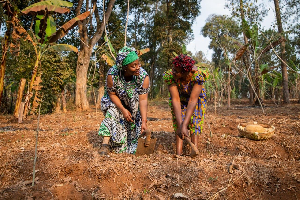Business News of Friday, 28 August 2020
Source: goldstreetbusiness.com
Coronavirus impact curtails Ghana’s FDI commitments
As widely expected, the arrival of Covid 19 in Ghana and the requisite public policy responses resulted in a significant slowdown in Foreign Direct Investment (FDI) commitments into the country, data released by the Ghana Investment Promotion Centre earlier this week has confirmed.
During the period April 1 to June 12 this year, only 13 new projects with foreign shareholding were registered with GIPC, down from 34 projects during the corresponding period of 2019. The total FDI value for that period of 2020 was US$9,292,427.79, this amounting to a 77 percent decline from the US$40,108,819.91 million committed in the corresponding period of 2019. This was accompanied by a near commensurate fall in overall investment registered with GIPC for the period (inclusive of local partner investments) from US$43,099.801.34 to US$11,247,548.28.
However, towards the tail end of the quarter a sharp pick up in new FDI commitments has been reported bringing the number of projects to 21. The surge in new commitment coincided with the beginning of easing of restrictions placed earlier to curb the viral infection and this suggests that as phased easing of restrictions continues, FDI will rise towards the levels that established Ghana as the leading destination of FDI in West Africa ahead of neighboring Nigeria with its much bigger economy.
Between April 1 and June 12 this year – when economic and social restrictions to curb the viral infection were at their height – the manufacturing sector attracted four commitments from foreign direct investors; the services sector four; general trade three; and export trade two. Instructively no investment commitments were secured during the period for the agriculture, building and construction or tourism sectors.
Analysts attribute the reticence by foreign investors under the current dispensation to several factors, including uncertainty about Ghana’s and the world’s short to medium term economic prospects and fears about the health risks of international travel. The closure of Ghana’s borders and the lock down of both Accra and Kumasi for three weeks in April presented further practical constraints to potential foreign direct investors.
The enthusiasm and confidence of potential foreign direct foreign investors was also inevitably dampened by the adverse effects of the arrival of coronavirus on foreign owned enterprises already operating in Ghana. A recent study by GIPC on the impact of the viral outbreak and the public policy responses on enterprises with foreign shareholding revealed several types of negative impacts in the form of payment and repayment delays, reduction in demand for products/servicing, partial shutdowns, restrictions in movement, supply chain disruption, logistics and transportation challenges, financial constraints, reduced cash flow and staff retrenchment.
Per the findings of the survey, about 57% foreign investors face a high risk and moderate risk of going out of business
In all cases, majority claimed that extending due dates, grant of waiver of penalties, waiver of VAT, waiver of taxes, assisting in the supply chain, reduction in tariffs on imports, other forms of assistance, grant of deduction against income tax, low-interest loans, reduction in utility bills will go a long way to support their businesses.
The findings from the survey suggested that the local business support scheme is very helpful, with ease of access to information and benefits from Government regarding COVID-19 support for businesses being moderately easy. Suggestions on aiding the GIPC to provide short- term, medium-term and long-term support / interventions to their business was in Loans and Grants, Reduction of Charges, Waivers and Taxes, Market/Corporate and Business Share and General aid to business.
Lastly, foreign investors opined that, although the pandemic has an adverse impact on their businesses, there happen to be new business opportunities that could offset and mitigate overall effects. They identified opportunities in food processing, agriculture, manufacturing, ICT.












